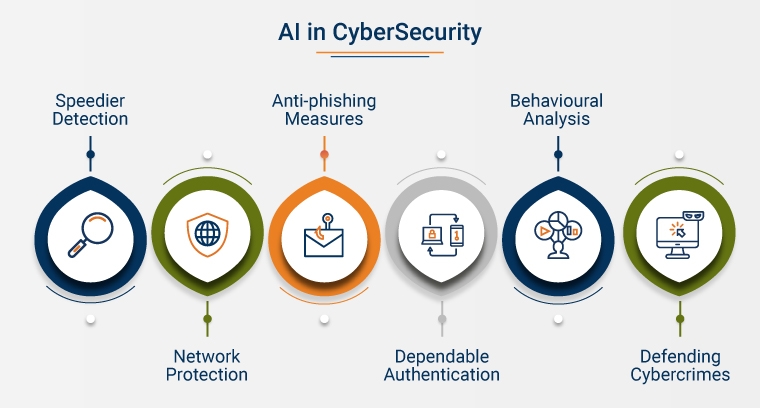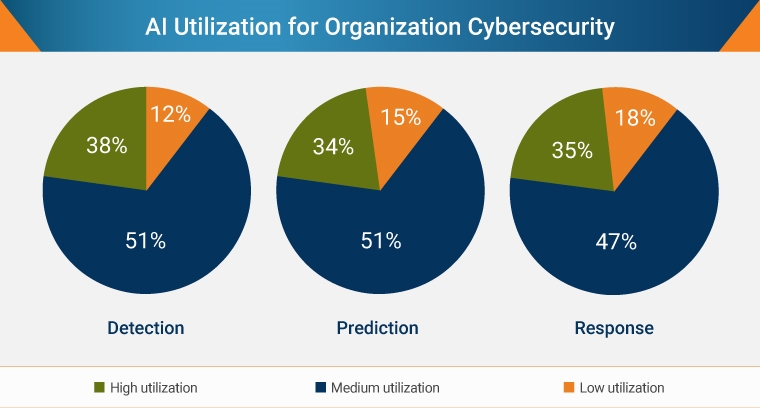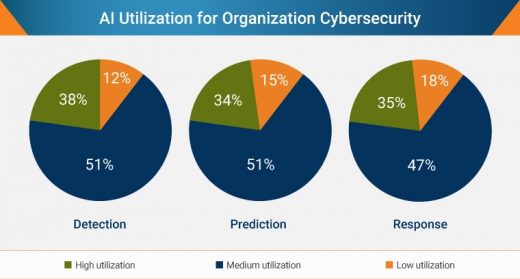The Future of AI in Cyber Security Testing: Unlock the Potential
The Future of AI in Cyber Security Testing: Unlock the Potential

A model set of opportunities and obstacles have emerged with the advent of the digital age. Cyber security testing has become increasingly important as organizations look to protect their networks, data, and systems from malicious attacks.
As technology continues to evolve and become more sophisticated, artificial intelligence (AI) is tapped up as a way to improve cybersecurity testing. Although, AI has the potential to significantly reduce the time and effort needed to find and fix vulnerabilities, as well as to detect and respond to threats more quickly.
AI can also help to identify patterns and uncover hidden threats that may have gone undetected. With AI driving the future of cyber security testing, organizations will have the tools they need to stay ahead of the curve and keep their data safe.
Introduction to AI in Cyber Security Testing
AI-based cyber security testing solutions use algorithms and machine learning to identify potential vulnerabilities and weaknesses in a network. By leveraging AI, organizations can detect and analyze malicious threats and suspicious activities more quickly and accurately than ever before. Moreover, AI-based solutions can also detect patterns in cyber security threats and provide insights into potential attack vectors.
The advantages of using AI in cyber security testing are numerous. AI-based solutions can help organizations save time, money, and resources by identifying potential threats and vulnerabilities more quickly and accurately.
Moreover, AI-based solutions can provide a more detailed and comprehensive analysis of security threats and vulnerabilities than their manual counterparts. This allows organizations to identify and mitigate current and future cyber security threats more effectively.
Advantages of AI in Cyber Security Testing
One of the major advantages of using AI in cyber security testing is its ability to detect and analyze anomalies. AI-based solutions can detect abnormal activities and patterns in data, which can help organizations identify potential cybersecurity threats and vulnerabilities.
Another advantage is its ability to quickly and accurately identify malicious threats. By leveraging AI-based solutions, organizations can detect potential attacks before they occur and take the necessary steps to mitigate them.
-

AI-in-CyberSecurity — Image Credit: Provided by the Author
1. Artificial Intelligence Gets Smarter Over Time
As it can gradually increase network security, artificial intelligence technology is more effective and sophisticated than its name might imply. Artificial intelligence uses machine learning and deep learning to understand more about the network behavior of an organization over time. They identify the patterns that are present on the network, and after doing so, the AI technology groups them together before moving on to determine whether any deviations from typical traffic or security incidents occurred. When it has finished processing the traffic, it reacts to them.
2. AI Aids in the Identification of Unknown Threats
Due to the rise in malware assaults and sophisticated social engineering, where attackers try new tactics to destroy the system, it becomes vital to transition to updated solutions to stop cyberattacks from damaging the system. Artificial intelligence combined with cyber security has shown to be one of the greatest combos for security technologies in terms of detecting and preventing unknown threats from destroying an organization’s network infrastructure.
3. AI Is Capable of Handling a Large Amount of Data
Artificial intelligence enters the scene to identify any potential risks that can be misconstrued as routine activities. It turns out to be the ideal option because it is so useful. It scans through huge amounts of data and examines the traffic to look for any potential risks because it automates, which enables it to do so.
A residential proxy is a piece of technology that uses artificial intelligence to facilitate data transfer. Additionally, it is capable of performing threat detection and identifying the flow of traffic.
4. Artificial Intelligence Is Better at Handling Vulnerability
Artificial intelligence is quicker and can assist us in assessing our systems more quickly than cybersecurity personnel, which reduces our workload and increases our capacity for problem-solving by multiples. AI also identifies the weak spots in software operations and business networks, allowing organizations to concentrate on more crucial security-related tasks. This enables the timely security of corporate systems and the management of vulnerability.
Moreover, AI-based solutions can provide real-time analysis of security threats and vulnerabilities. This allows organizations to respond quickly to any potential threats and take the necessary steps to protect their networks from attack. Finally, AI-based solutions can help organizations automate many of their cyber security testing processes, freeing up resources for other tasks.
Cybersecurity and AI: Three Key Functions
AI’s three key purposes in the domain of cybersecurity are as follows:
Prediction: The prediction function is used the second most frequently. About 35% of businesses heavily rely on AI to foresee cyber attacks. Based on its training, the AI produces predictions by sifting through various data kinds.
Businesses that use AI for the prediction can use the technology to automatically analyze their assets and network topology, pinpoint significant weaknesses, and constantly strengthen their network defenses against any potential catastrophic assaults.
Detection: Organizations now heavily rely on AI to identify cyber threats. A strong usage rate for detection is present in more than 50% of organizations employing AI-based cybersecurity solutions. In detection, artificial intelligence (AI) uses behavioral analysis to identify unusual traffic continuously. This is one of AI’s distinctive features, enabled by machine learning or deep learning.
Response: Last but not least, AI is still developing when it comes to defending against threats. Only 18% of businesses utilize AI extensively to defend against cyberattacks. This entails building new defense mechanisms in real-time or automating the development of a virtual patch for threat identification.
Attacks may easily be detected and stopped in real-time using an AI response strategy. This solution shut down anomalous behavior that was brought on by bots, such as the use of stolen credentials or unauthorized purchases made on customer accounts.
Regardless of how an enterprise employs AI for cybersecurity, it aids in reducing costs, improving threat reaction times, and responding to breaches.
-

AI-Utilization-for-Organization-Cybersecurity. Image Credit: Provided by the Author.
Challenges of AI in Cyber Security Testing
While the advantages of using AI in cyber security testing are numerous, there are also a few challenges to consider. One of the major challenges is the cost of implementing and maintaining AI-based solutions. AI-based solutions require a significant amount of resources, both in terms of hardware and personnel, and this can be a barrier for some organizations.
Another challenge is the complexity of AI-based solutions. AI-based solutions are often complex and require a considerable amount of time and resources to configure and maintain. Moreover, AI-based solutions require a great deal of training to be effective, and this can be a challenge for some organizations.
Finally, AI solutions are only as effective as the data is available. If the data used to train AI-based solutions is incomplete or inaccurate, the results may not be reliable. This can lead to false positives and false negatives, which can lead to ineffective or inaccurate security testing results.
AI-based Security Testing Services
There are many AI-based security testing solutions available on the market. Some of the most popular solutions include:-
- Intrusion Detection Systems (IDS):- IDS are AI-powered systems that are used to detect and respond to malicious activities on a network. They use algorithms to analyze network traffic and identify suspicious activities.
- Vulnerability Management Systems (VMS): VMS is an AI-powered system that is used to assess and identify potential vulnerabilities in a network. They use algorithms to scan for weaknesses in a network and provide recommendations for mitigating any potential threats.
- Behavioral Analytics:- Behavioral analytics are AI-powered systems that are used to detect and analyze suspicious user behavior. They use algorithms to monitor user activities and identify any potential malicious activities.
- Security Auditing Systems:- Security auditing systems are AI-powered systems that are used to assess the security posture of an organization. They use algorithms to analyze networks and identify any potential weaknesses or vulnerabilities.
These are just a few of the AI-based security testing solutions available on the market. Certainly, with the right AI-based security testing solution, organizations can gain a better understanding of their cyber security posture and reduce the risk of attack.
How to Leverage AI in Your Cyber Security Testing
To leverage AI in your cyber security testing, it is important to understand the different types of AI-based security testing solutions available. Firstly, once you have a better understanding of the various AI-based solutions, you can begin to evaluate which solutions best meet your security needs.
When evaluating AI-based security testing solutions, there are several key factors to consider. These include:-
- Cost:- It is important to evaluate the cost of implementing and maintaining AI-based security testing solutions.
- Scalability:- It is important to evaluate the scalability of the AI-based security testing solution.
- Accuracy:- It is important to evaluate the accuracy of the AI-based security testing solution.
- Ease of Use:- It is important to evaluate the ease of use of the AI-based security testing solution.
By evaluating these factors, you can determine which AI security testing solution best suits your needs.
AI-Based Cyber Security Testing Use Cases
AI security testing solutions is useful in a variety of different use cases. Some of the most popular use cases include:
- Network Security Monitoring: AI-based security testing solutions can be used to monitor networks for malicious activities and suspicious behaviors.
- Vulnerability Detection and Remediation: AI-based security testing solutions can be used to detect and remediate potential vulnerabilities in a network.
- Intrusion Detection and Prevention: AI-based security testing solutions can be used to detect and prevent malicious activities on a network.
- Security Auditing: AI-based security testing solutions can be used to assess the security posture of an organization.
By leveraging AI-based security testing solutions, organizations can gain a better understanding of their cyber security posture and take the necessary steps to protect their networks from attack.
How to Improve Your AI-Based Security Testing Strategy
To improve your AI-based security testing strategy, it is important to understand the different types of AI-based security testing solutions available. Once you have a better understanding of the different AI-based solutions, you can begin to evaluate which solutions best meet your security needs.
Although, it is also important to evaluate the accuracy and scalability of your AI-based security testing solutions. This will ensure that you can accurately detect and analyze potential threats and vulnerabilities. Additionally, it is important to evaluate the cost of implementing and maintaining your AI-based security testing solutions. This will ensure that you can use the most cost-effective solutions for your needs.
Finally, it is important to ensure that your AI-based security testing solutions are regularly tested and updated. This will ensure that the results are accurate and up to date. Additionally, it is important to ensure that your AI security testing solutions are properly configured and maintained. Altogether, this will ensure that they can detect and analyze potential threats and vulnerabilities.
The Future of AI in Cyber Security Testing
The future of AI in cyber security testing is bright. As organizations continue to invest in AI-based security testing solutions, the technology will become more advanced and effective. AI-based solutions will become more efficient and accurate, allowing organizations to detect and analyze potential threats and vulnerabilities more quickly and accurately.
Moreover, AI-based solutions will become more cost-effective. As organizations continue to invest in AI-based security solutions, the cost of implementation and maintenance will decrease. This will make AI-based solutions more accessible to organizations of all sizes.
Finally, AI-based solutions will become more sophisticated. As organizations continue to invest in AI-based solutions, the technology will become more advanced and capable. This will allow organizations to more accurately detect and analyze malicious activities, as well as identify potential attack vectors.
Conclusion
In conclusion, AI-based solutions have quickly become an essential tool for testing and improving cybersecurity systems. AI-based solutions can help organizations save time, money, and resources by identifying potential threats and vulnerabilities more quickly and accurately. Moreover, AI-based solutions can provide real-time analysis of security threats and vulnerabilities and automate many of their cyber security testing processes.
When selecting an AI-based security testing solution, it is important to evaluate the cost, accuracy, scalability, and ease of use of the solution. Additionally, it is important to ensure that the AI-based security testing solution is regularly tested and updated. Finally, it is important to understand the different use cases for AI-based security testing solutions to determine which solution best meets your needs.
AI-based solutions have the potential to revolutionize the cybersecurity space. As organizations continue to invest in AI-based solutions, the technology will become more advanced and effective, allowing organizations to identify and mitigate current and future cybersecurity threats more effectively.
If you want to stay ahead of the curve regarding cyber security, leveraging AI-based solutions is essential. By understanding the advantages, challenges, and use cases of AI-based security testing solutions, you can develop an effective AI-based security testing strategy and unlock the full potential of AI in cyber security testing.
Featured Image Credit: Provided by the Author; Thank you!
The post The Future of AI in Cyber Security Testing: Unlock the Potential appeared first on ReadWrite.
(18)


